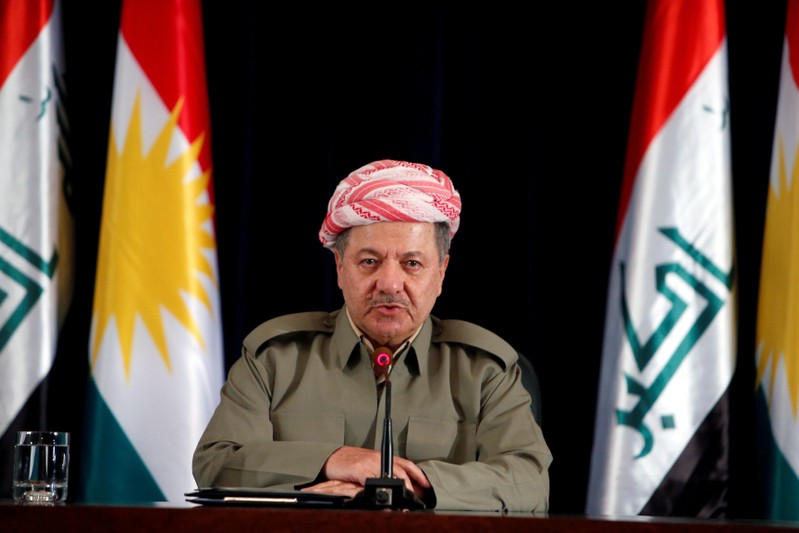
FILE PHOTO – Iraqi Kurdish president Masoud Barzani speaks during a news conference in Erbil, Iraq September 24, 2017. REUTERS/Azad Lashkari/File Photo
October 29, 2017
ERBIL, Iraq (Reuters) – Masoud Barzani, who spent decades leading the long-oppressed Kurds, confirmed on Sunday he was stepping down as president of the Kurdistan Regional Government after his drive for independence backfired.
After decades of struggle, critics say Barzani made one of his biggest mistakes by pushing hard for a Sept. 25 referendum.
Kurds voted overwhelmingly for independence, but won little sympathy outside their region. As well as the Iraqi government, Turkey and Iran threatened to take tough action against any move towards secession, fearing it would encourage their own restive Kurdish populations to follow suit.
The United States and other Western powers joined the chorus of opposition to the vote. The Baghdad government rejected it as illegal and sent troops to seize the oil city of Kirkuk, which the Kurds regard as the heart of any future homeland.
In just a few hours, the city the Kurds regard as sacred was gone, along with other Kurdish-held territory across the north. Some accused Barzani of having led his people to disaster.
For many years, he had used cunning and patience to help the Kurds survive long years of brutality under Saddam Hussein.
After the U.S.-led invasion that toppled Saddam in 2003, Barzani became a central figure in the drive to create an autonomous Kurdish state in northern Iraq.
Kurdish leaders kept their territory relatively free of the sectarian bloodshed that plagued most of Iraq. Western oil executives flocked to the region seeking deals.
Kurds showed their military capability by joining Iraqi government troops and Iranian-backed paramilitary forces to drive Islamic State militants out of Mosul.
Confident that the time was right for an independent homeland, Barzani pursued the referendum.
It resulted in overwhelming support for secession. But the joy was short-lived as Iraqi government forces and Shi’ite paramilitaries shattered the Kurds’ dreams with a series of lightning military advances.
Barzani was born in 1946, soon after his legendary father founded a party to fight for the rights of Iraqi Kurds.
Deeply influenced by his father, Mulla Mustafa Barzani, known as the Lion of Kurdistan, Masoud Barzani joined the Kurdish guerrilla forces known as the Peshmerga at the age of 16 and gained fighting experience in the mountains.
“BETRAYAL”
The younger Barzani would become familiar with one of the popular themes in Kurdish history – betrayal by regional and Western powers.
Exiled and dying of cancer in a Washington hospital in 1976, Mulla Mustafa lamented that he had ever trusted the United States.
A year earlier, Mulla Mustafa had been fighting a guerrilla war against Baghdad backed by Iran’s pro-Western shah, but he was left high and dry when then-U.S. Secretary of State Henry Kissinger brokered a deal that allowed Saddam to crush the Kurds.
During the 1980-88 Iran-Iraq war, Masoud Barzani allied the Kurdistan Democratic Party that he had inherited from his father with Tehran once more. It did not go well. Some 8,000 Barzani tribesmen were rounded up and paraded through Baghdad before being executed. In Saddam’s words: “They went to hell.”
Despite the massacres, and Iraqi chemical attacks, Barzani retained enough of a fighting force to respond to President George Bush’s appeal for an uprising during the 1991 Gulf War.
Taking Bush at his word, the Kurds rose up against Saddam, and Barzani and his Peshmerga – known as “those who face death” – came down from the mountains to join the uprising and capture several cities in the north.
But the victorious allies balked at the prospect of a Kurdish split from Baghdad and did nothing to stop Saddam’s troops and helicopter gunships from crushing the rebellion.
While more than a million Kurds fled to Turkey and Iran, many dying of hunger and exposure on the way, Barzani stayed to fight on.
He was saved by a U.S. and British no-fly zone established over the north in 1991 which allowed him and his Kurdish rival, Jalal Talabani, to retake the area.
This was followed by the longest period of Kurdish autonomy in modern history, but it was scarred by civil war between Barzani and Talabani’s Patriotic Union of Kurdistan in the mid-1990s.
Barzani invited Iraqi government tanks into the region in 1996 to seize the regional capital Erbil, sending not only Talabani, but dozens of CIA personnel and their local employees fleeing before them.
Talabani died barely a week after last month’s referendum.
Barzani’s exit will leave the Kurds lacking direction, with their two main leaders gone.
(Editing by Michael Georgy and Giles Elgood)
